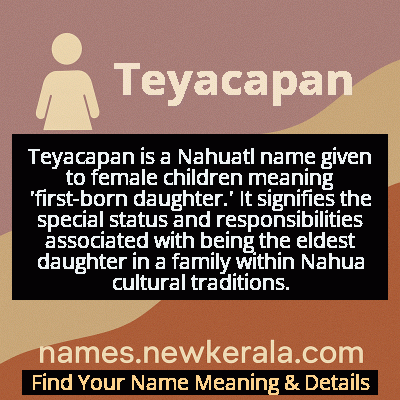Teyacapan Name Meaning & Details
Origin, Popularity, Numerology Analysis & Name Meaning of Teyacapan
Discover the origin, meaning, and cultural significance of the name TEYACAPAN. Delve into its historical roots and explore the lasting impact it has had on communities and traditions.
Name
Teyacapan
Gender
Female
Origin
Nahuatl
Lucky Number
5
Meaning of the Name - Teyacapan
Teyacapan is a Nahuatl name given to female children meaning 'first-born daughter.' It signifies the special status and responsibilities associated with being the eldest daughter in a family within Nahua cultural traditions.
Teyacapan - Complete Numerology Analysis
Your Numerology Number
Based on Pythagorean Numerology System
Ruling Planet
Mercury
Positive Nature
Adventurous, dynamic, curious, and social.
Negative Traits
Restless, impatient, inconsistent, prone to indulgence.
Lucky Colours
Green, white.
Lucky Days
Wednesday.
Lucky Stones
Emerald.
Harmony Numbers
1, 3, 9.
Best Suited Professions
Sales, marketing, travel, entertainment.
What People Like About You
Versatility, charisma, adventurous spirit.
Famous People Named Teyacapan
Teyacapan
Noblewoman
Daughter of Aztec ruler Moctezuma II, played significant role in early colonial period cultural preservation
María Teyacapan
Cultural Interpreter
Bridged Nahua and Spanish cultures during colonial transition, documented traditional practices
Isabel Teyacapan
Community Leader
Maintained Nahua traditions and language preservation in central Mexico
Name Variations & International Equivalents
Click on blue names to explore their detailed meanings. Gray names with will be available soon.
Cultural & Historical Significance
In contemporary indigenous movements, Teyacapan has gained additional significance as a symbol of cultural resilience and the reclamation of native identity. The name serves as a conscious choice for parents seeking to honor their heritage and ensure the survival of Nahuatl language and customs. It represents a living connection to ancestral practices while adapting to modern contexts, embodying both historical continuity and contemporary cultural pride within indigenous communities throughout Mexico and the diaspora.
Extended Personality Analysis
Individuals named Teyacapan are often perceived as natural leaders with strong protective instincts toward family and community. They typically exhibit maturity beyond their years, displaying responsibility, reliability, and organizational skills that make them effective in caretaking roles. There's often a deep sense of tradition and cultural pride associated with bearers of this name, manifesting as respect for elders, commitment to preserving family customs, and serving as pillars within their social circles. Their first-born status symbolism frequently translates into practical personality characteristics including initiative-taking, problem-solving abilities, and a nurturing disposition that others naturally gravitate toward for guidance and support.
Beyond these foundational traits, Teyacapan-named individuals often demonstrate remarkable resilience and adaptability, qualities that reflect the historical journey of indigenous cultures through colonization and modernization. They tend to be culturally grounded yet forward-thinking, balancing respect for tradition with innovative approaches to contemporary challenges. Many exhibit strong communication skills, particularly in bridging different generations or cultural perspectives, and often take on roles as cultural ambassadors or community organizers. The weight of being 'first' in their name meaning often inspires them to be pioneers in their chosen fields while maintaining strong connections to their roots and community obligations.
Modern Usage & Popularity
In contemporary times, Teyacapan remains a rare but culturally significant name primarily used within Nahua communities and among families seeking to reconnect with their indigenous heritage. The name has seen a modest resurgence as part of broader indigenous language revitalization movements across Mexico and among diaspora communities. While not appearing on mainstream popularity charts, it holds particular importance in cultural preservation contexts, often chosen by parents who value traditional naming practices and wish to honor their ancestral roots. Modern usage reflects both cultural pride and educational awareness about pre-Columbian history and linguistic traditions, with the name serving as a statement of identity and resistance against cultural homogenization.
Symbolic & Spiritual Meanings
Symbolically, Teyacapan represents leadership, tradition, and cultural continuity. The name embodies the concept of primogeniture not just in biological terms but as a metaphor for carrying forward ancestral wisdom and responsibilities. It symbolizes the bridge between generations, serving as a living connection to cultural heritage and historical memory. Metaphorically, Teyacapan suggests being a foundation stone upon which family and community structures are built, representing stability, guidance, and the enduring nature of cultural identity despite external pressures and changing times. The name also carries connotations of cultural stewardship and the sacred duty of preserving language and traditions for future generations.

